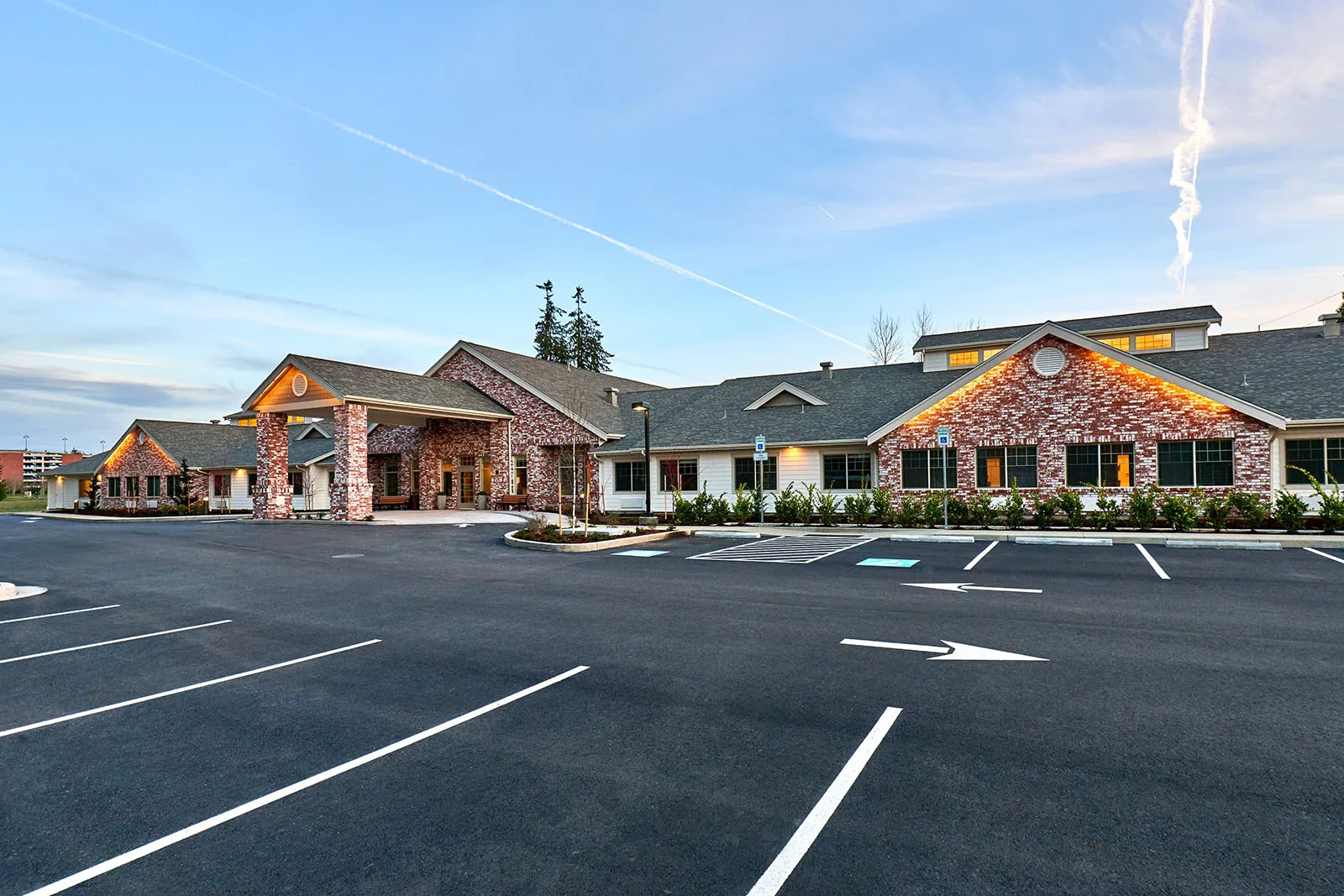How Do I Talk to My Parents About Moving Into Senior Living?

How Do I Talk to My Parents About Moving Into Senior Living?
Starting a conversation with your parents about moving into senior living can feel overwhelming. It’s one of the most important discussions you’ll have as a family—filled with emotions, concerns, and the desire to ensure your loved ones feel supported and respected. Whether you’re considering assisted living, memory care, or respite care, approaching the topic thoughtfully can make all the difference.
Why the Conversation Matters
Many families wait until a crisis happens before discussing care options. By starting the conversation early, you empower your parents to share their preferences, reduce stress, and allow time to explore communities together. The goal is not to force a decision, but to create a partnership in planning for the future.
What Is Senior Living Today?
When many people hear the term “senior living,” they imagine the nursing homes of decades past—sterile environments where residents spent most of their days in bed or staring at the television. But today’s senior living communities are very different.
Modern senior living has evolved into vibrant, engaging environments that emphasize:
- Social connection through group activities, events, and outings.
- Wellness and lifestyle with exercise classes, clubs, and personalized enrichment.
- Delicious dining with chef-prepared meals served in restaurant-style settings.
- Comfortable, well-designed spaces that feel like home, not a hospital.
- Supportive care services tailored to each resident’s needs, whether minimal assistance or full memory support.
Instead of limiting independence, senior living often enhances it by removing the burdens of home maintenance, cooking, and isolation, while offering peace of mind for families.
Step 1: Prepare Yourself First
Before talking with your parents, gather information about:
- Types of senior living – Independent living, assisted living, memory care, and respite care or short-term stays.
- Costs and payment options – Understand average monthly fees and what’s included.
- Local senior living communities – Tour a few ahead of time so you have examples to share.
Being prepared shows respect and helps answer questions confidently.
Step 2: Choose the Right Time and Place
These conversations are best held when everyone is calm and not distracted. Choose a comfortable, private setting. Avoid raising the topic during a stressful situation such as a hospitalization or family emergency. Instead, bring it up during a relaxed visit, a walk, or a meal together.
Step 3: Start With Care and Empathy
When approaching this conversation, it’s important to come from a place of love and respect. Use “I” statements so your parent doesn’t feel blamed or pressured. Focus on your concern for their well-being and quality of life.
Examples of gentle ways to begin include:
- “I’ve noticed it’s been harder for you to keep up with the house, and I worry it’s exhausting for you.”
- “I want you to feel safe and supported as you get older, and I think exploring options might help.”
- “I get nervous when you’re home alone, especially at night. I just want to make sure you always feel secure.”
- “I’ve seen you skip meals sometimes, and I’m concerned you’re not eating as well as you should. A community might make it easier to enjoy healthy meals every day.”
- “I know you miss spending time with friends. Moving to a senior living community could give you more chances to socialize and do activities you enjoy.”
- “I want you to keep doing the things you love, without worrying about chores, cooking, or house maintenance.”
- “It would give me peace of mind knowing you have support close by, in case you ever need help quickly.”
- “I know this isn’t an easy topic, but I love you and want to make sure we think about the future together.”
- “I have a friend whose mother is living in a senior living community, and she loves it. Hearing about her experience made me think it might be a good option for us to explore too.”
This approach reduces defensiveness, emphasizes care, and helps your parent see that your motivation comes from genuine concern for their happiness and safety.
Step 4: Address Common Concerns
It’s normal for parents to push back or feel uncertain about the idea of moving. Here are some of the most common concerns families hear—and ways you can respond with empathy and reassurance:
- “I don’t want to lose my independence.”
→ Modern senior living promotes independence. Residents choose how to spend their days and what activities to join. Staff provide help only when needed, so your parent can keep doing the things they enjoy.
- “I’m not ready for a nursing home.”
→ Senior living communities are not nursing homes. Assisted living and memory care provide personalized support in warm, engaging environments—not medical institutions.
- “It will be too expensive.”
→ At first glance, senior living may seem costly, but when you add up rent or mortgage, groceries, utilities, in-home care, transportation, and maintenance, the difference is often smaller than expected. Plus, everything is included in one monthly fee.
- “I don’t want to be around people I don’t know.”
→ Moving somewhere new can be intimidating, but senior living communities make it easy to build friendships through activities, shared meals, and welcoming staff who help residents connect.
- “I’m fine living at home—I don’t need help yet.”
→ Many seniors move in before they “need” significant care so they can enjoy the lifestyle, social opportunities, and peace of mind early. Waiting until a crisis happens often limits choices.
- “I don’t want to leave my house full of memories.”
→ Downsizing is difficult, but moving into senior living doesn’t erase the past—it creates space for new memories. Some families encourage parents to bring favorite furniture, keepsakes, and photos to make their apartment feel just like home.
- “I’m worried I’ll be forgotten once I move.”
→ In reality, family involvement often increases after a move, because visits can focus on quality time rather than chores or caregiving stress. Communities also host family events, making it easy to stay connected.
- “I’ll be bored.”
→ Today’s communities offer full calendars of entertainment, fitness, classes, excursions, and hobby groups. Many residents say they’re busier and more engaged than they ever were at home.
By preparing for these objections ahead of time, you’ll be able to approach the conversation with compassion and practical solutions.
Step 5: Explore Options Together
Help your parents understand the range of senior living choices:
- Independent Living: For seniors who want a maintenance-free lifestyle with social opportunities.
- Assisted Living: Ideal for those who need help with daily activities like medication, bathing, or meals.
- Memory Care: Specialized support for individuals with Alzheimer’s or other forms of dementia in a safe, structured setting.
- Respite Care: Short-term stays that provide caregivers a break while seniors experience the community firsthand.
Tour communities together and involve your parents in decision-making so they feel in control.
Step 6: Involve the Whole Family
Siblings and close relatives should be included to avoid misunderstandings. A united family approach ensures consistency and shows your parents that this is a shared concern, not just one child pushing the idea.
Step 7: Take Small Steps
Instead of expecting an immediate decision, consider gradual steps:
- Visit a community for lunch or an activity.
- Suggest a short-term respite stay to “try it out.”
- Schedule a tour together and meet with the care team.
These smaller steps can make the idea less intimidating.
Step 8: Highlight the Benefits of Senior Living
Reassure your parents by focusing on the positives:
- Safety and peace of mind with 24/7 staff support.
- Engaging activities including art classes, live music, movie nights, fitness programs, gardening clubs, and day trips.
- Healthy dining with chef-prepared meals, diet accommodations, and snacks available throughout the day.
- Wellness focus with access to therapy, exercise classes, and health monitoring.
- Maintenance-free living without the stress of yardwork, repairs, or bills.
- Opportunities for purpose through volunteer projects, leadership in resident councils, and hobbies.
- Specialized care for memory support when needed, designed around dignity, safety, and joy.
Final Thoughts
Talking with your parents about moving into senior living is not a one-time event—it’s an ongoing conversation rooted in love, respect, and concern for their quality of life. By preparing, listening, and involving them in decisions, you can help make the transition smoother and more positive.
ONELIFE Senior Living: We Are Here to Help
At ONELIFE Senior Living, we know these conversations aren’t always easy. That’s why we’re here to be a resource for families—not just when you choose one of our communities, but anytime you’re exploring care options. Our team can answer questions, guide you through the decision-making process, and connect you with the right level of support for your loved one.
Frequently Asked Questions (FAQ)
1. What is senior living really like today?
Senior living has evolved far beyond the old image of nursing homes. Today’s communities focus on comfort, connection, and lifestyle. Residents enjoy chef-prepared meals, wellness programs, social activities, entertainment, and safe, beautifully designed environments with care tailored to individual needs.
2. How do I know if my parent needs senior living?
Some signs include difficulty managing daily tasks, safety concerns at home, isolation or loneliness, memory lapses, or health issues that require consistent support. Even if your parent is still fairly independent, senior living can provide peace of mind and opportunities for social engagement.
3. What is the difference between assisted living and memory care?
Assisted living helps seniors with activities of daily living such as bathing, dressing, or medication while encouraging independence. Memory care, on the other hand, provides secure, specialized support for people living with Alzheimer’s or other forms of dementia, with trained staff and structured daily programming.
Read More: 5 Key Difference between Memory Care and Assisted Living
Read More: Understanding the Difference Between Memory Care, Dementia Care, Assisted Living, and Nursing Homes
4. Can my parent try senior living before making a permanent move?
Yes. Many communities offer respite care, which allows your parent to stay for a few days or weeks. This gives families a break from caregiving while allowing seniors to experience the lifestyle and services firsthand.
5. How much does senior living cost?
Costs vary depending on location and level of care. Assisted living typically ranges between $4,000–$6,500 per month, while memory care can range from $5,000 to $10,000+ per month. These fees often include housing, meals, care services, and activities—expenses that add up quickly when living at home.
6. How do I start the conversation with my parents?
Begin with empathy. Share your concerns for their well-being using “I” statements, avoid rushing the decision, and include them in the process. You might start with a casual visit to a community or a respite stay to help ease the transition.
7. What are the biggest benefits of moving into senior living?
Senior living provides safety, social connection, and freedom from household responsibilities. Residents enjoy engaging activities, fitness and wellness programs, nutritious dining, and the reassurance of 24/7 support. For those in memory care, specialized programs create opportunities for joy and dignity every day.
Explore ONELIFE Communities Across the Country
ONELIFE Senior Living is proud to serve families in multiple regions, offering exceptional care and support tailored to each resident’s needs. In Springfield, Oregon, The Esther at Riverbend Assisted Living provides personalized assisted living services, while The Rawlin at Riverbend Memory Care specializes in compassionate Alzheimer’s and dementia care. Families in Salem can find trusted support at Battle Creek Memory Care, and those in Beaverton benefit from the warm, secure environment at Waterhouse Ridge Memory Care.
For families in Nevada, Vineyard Henderson Memory Care offers expert dementia care in the heart of Henderson, while in California, The Reserve at Fountaingrove Memory Care provides high-quality memory support in Santa Rosa, and The Woodlake Senior Living serves Sacramento with a full spectrum of senior living options. In Cottage Grove, Oregon, Middlefield Oaks Senior Living combines independence and care, while in the Midwest, The Laurel at Vernon Hills Memory Care stands as a dedicated resource for families in Vernon Hills, Illinois. Finally, in Phoenix, Arizona, Shadow Mountain Memory Care delivers compassionate, all-inclusive memory care in a safe and engaging setting.
No matter which location you choose, every ONELIFE community is united by the same mission: providing exceptional care, meaningful activities, and a true sense of family for residents and loved ones.
Contact us
learn more about our
community

More Articles & Resources
EXPLORE THE ONELIFE COMMUNITIES




















